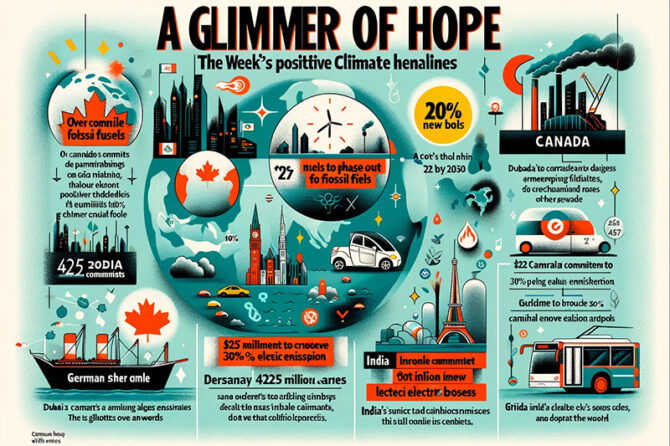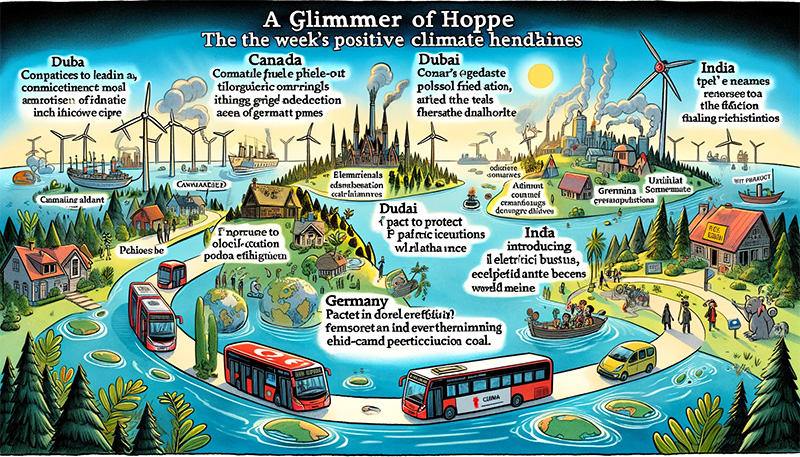
The fight against climate change often feels daunting, with ever-present reports of extreme weather events, rising sea levels, and accelerating biodiversity loss. However, amidst the headlines of despair, glimmers of hope emerge, highlighting the growing global commitment to tackling this existential threat. This week, we witnessed a string of positive developments, offering a much-needed dose of optimism and momentum for the future.
1. 100+ Countries Back Fossil Fuels Phase-Out: In a historic move during COP28, over 100 countries, including the European Union and the Organisation of African, Caribbean and Pacific States, officially endorsed a fossil fuel phase-out. This unprecedented commitment signifies a major shift in the global energy landscape, signalling a clear path towards a cleaner and more sustainable future.
2. Canada Moves to Cut Oil & Gas Emissions by 38%: Canada, a major oil and gas producer, made waves by announcing a significant reduction target for its emissions from these sectors. The ambitious 38% cut by 2030 demonstrates a willingness to take concrete action towards achieving a net-zero future.
3. Dubai to Cut Emissions by 50% by 2030: While often associated with opulence and luxury, Dubai is taking bold steps to reduce its environmental impact. The city announced a 50% emissions reduction target by 2030, emphasizing its commitment to sustainable development and green urbanization.
4. $225 Million to Protect 30% of Pacific Ocean: In a landmark agreement, 13 countries bordering the Pacific Ocean pledged to protect at least 30% of its waters by 2030. This initiative, backed by a $225 million commitment, will help safeguard marine ecosystems and address the growing threat of overfishing and climate change.
5. 50,000 New E-Buses in India by 2027: India, a nation plagued by air pollution, is embarking on a massive electrification of its public transport system. The government’s plan to introduce 50,000 new electric buses by 2027 will significantly reduce emissions and improve urban air quality.
6. Coal Down 47.3% in Germany in 3Q23 vs. 3Q22: Germany, once heavily reliant on coal, witnessed a dramatic decline in its consumption during the third quarter of 2023. The 47.3% decrease compared to the same period in 2022 highlights the country’s commitment to phasing out coal and transitioning towards renewable energy sources.
These positive developments, while encouraging, are just the beginning. Transforming the global economy away from fossil fuels and towards a sustainable future requires sustained efforts from governments, businesses, and individuals.

Key Statistics:
- Over 100 countries representing more than 60% of the global population have now committed to a fossil fuel phase-out.
- Renewable energy sources are expected to contribute 90% of global electricity generation growth by 2050.
- The global electric vehicle market is projected to reach $800 billion by 2030.
- Investments in clean energy technologies reached a record high of $750 billion in 2022.
Moving Forward:
These recent developments demonstrate the growing global momentum towards a sustainable future. However, much work remains. To translate these commitments into tangible results, we need to:
- Accelerate the development and deployment of renewable energy technologies.
- Invest in energy efficiency and infrastructure improvements.
- Implement policies that incentivize clean energy and discourage fossil fuels.
- Engage in international cooperation and collaboration to address climate change on a global scale.
The road ahead will undoubtedly be filled with challenges. However, the recent positive developments offer a glimmer of hope and a clear path towards a brighter and more sustainable future. By building on these gains and committing to continued action, we can collectively create a world where clean air, healthy ecosystems, and a stable climate are the norm, not the exception.
Prof. Dr. Prahlada N.B
11 December 2023
Chitradurga

















Leave a reply